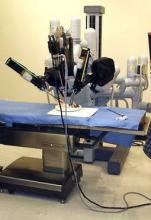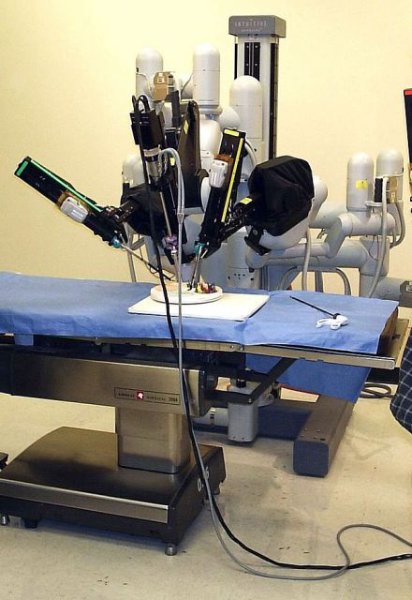User login
Compared with open radical cystectomy, robot-assisted laparoscopic radical cystectomy did not reduce the number or severity of complications among patients with bladder cancer enrolled in a single-center randomized clinical trial, according to a letter to the editor in the New England Journal of Medicine.
Retrospective studies have suggested that the robot-assisted laparoscopic approach reduces the complication rate and shortens the length of hospitalization in patients with bladder cancer, many of whom are older, are smokers, and have coexisting conditions. This trial was designed to compare that approach against open radical cystectomy, with both procedures using extracorporeal urinary diversion, in 118 patients who had stage Ta-3N0-3M0 bladder cancer, said Dr. Bernard H. Bochner and his associates at Memorial Sloan Kettering Cancer Center, New York.
The primary outcome – the rate of complications of grade 2-5 within 90 days of surgery—was 62% (37 of 60 patients) with robot-assisted laparoscopic surgery, which was not significantly different from the 66% rate (38 of 58 patients) with open surgery. Similarly, the rates of high-grade complications were not significantly different (22% vs 21%), and the mean length of hospitalization was identical (8 days) in both groups. The amount of intraoperative blood loss was smaller with the robot-assisted surgery (mean difference, 159 cc), but the duration of surgery was shorter with open surgery (mean difference, 127 minutes).
"Because the trial was performed by experienced surgeons at a single, high-volume referral center, the results may not be generalizable to all clinical settings. Nonetheless, these results highlight the need for randomized trials to inform the benefits and risks of new surgical technologies before widespread implementation," Dr. Bochner and his associates said (N. Engl. J. Med. 2014;371:389-90).
This work was supported by the Sidney Kimmel Center for Prostate and Urologic Cancers at Memorial Sloan Kettering Cancer Center, Pin Down Bladder Cancer, and the Michael A. and Zena Wiener Research and Therapeutics Program in Bladder Cancer. Dr. Bochner and his associates reported no financial conflicts of interest.
Compared with open radical cystectomy, robot-assisted laparoscopic radical cystectomy did not reduce the number or severity of complications among patients with bladder cancer enrolled in a single-center randomized clinical trial, according to a letter to the editor in the New England Journal of Medicine.
Retrospective studies have suggested that the robot-assisted laparoscopic approach reduces the complication rate and shortens the length of hospitalization in patients with bladder cancer, many of whom are older, are smokers, and have coexisting conditions. This trial was designed to compare that approach against open radical cystectomy, with both procedures using extracorporeal urinary diversion, in 118 patients who had stage Ta-3N0-3M0 bladder cancer, said Dr. Bernard H. Bochner and his associates at Memorial Sloan Kettering Cancer Center, New York.
The primary outcome – the rate of complications of grade 2-5 within 90 days of surgery—was 62% (37 of 60 patients) with robot-assisted laparoscopic surgery, which was not significantly different from the 66% rate (38 of 58 patients) with open surgery. Similarly, the rates of high-grade complications were not significantly different (22% vs 21%), and the mean length of hospitalization was identical (8 days) in both groups. The amount of intraoperative blood loss was smaller with the robot-assisted surgery (mean difference, 159 cc), but the duration of surgery was shorter with open surgery (mean difference, 127 minutes).
"Because the trial was performed by experienced surgeons at a single, high-volume referral center, the results may not be generalizable to all clinical settings. Nonetheless, these results highlight the need for randomized trials to inform the benefits and risks of new surgical technologies before widespread implementation," Dr. Bochner and his associates said (N. Engl. J. Med. 2014;371:389-90).
This work was supported by the Sidney Kimmel Center for Prostate and Urologic Cancers at Memorial Sloan Kettering Cancer Center, Pin Down Bladder Cancer, and the Michael A. and Zena Wiener Research and Therapeutics Program in Bladder Cancer. Dr. Bochner and his associates reported no financial conflicts of interest.
Compared with open radical cystectomy, robot-assisted laparoscopic radical cystectomy did not reduce the number or severity of complications among patients with bladder cancer enrolled in a single-center randomized clinical trial, according to a letter to the editor in the New England Journal of Medicine.
Retrospective studies have suggested that the robot-assisted laparoscopic approach reduces the complication rate and shortens the length of hospitalization in patients with bladder cancer, many of whom are older, are smokers, and have coexisting conditions. This trial was designed to compare that approach against open radical cystectomy, with both procedures using extracorporeal urinary diversion, in 118 patients who had stage Ta-3N0-3M0 bladder cancer, said Dr. Bernard H. Bochner and his associates at Memorial Sloan Kettering Cancer Center, New York.
The primary outcome – the rate of complications of grade 2-5 within 90 days of surgery—was 62% (37 of 60 patients) with robot-assisted laparoscopic surgery, which was not significantly different from the 66% rate (38 of 58 patients) with open surgery. Similarly, the rates of high-grade complications were not significantly different (22% vs 21%), and the mean length of hospitalization was identical (8 days) in both groups. The amount of intraoperative blood loss was smaller with the robot-assisted surgery (mean difference, 159 cc), but the duration of surgery was shorter with open surgery (mean difference, 127 minutes).
"Because the trial was performed by experienced surgeons at a single, high-volume referral center, the results may not be generalizable to all clinical settings. Nonetheless, these results highlight the need for randomized trials to inform the benefits and risks of new surgical technologies before widespread implementation," Dr. Bochner and his associates said (N. Engl. J. Med. 2014;371:389-90).
This work was supported by the Sidney Kimmel Center for Prostate and Urologic Cancers at Memorial Sloan Kettering Cancer Center, Pin Down Bladder Cancer, and the Michael A. and Zena Wiener Research and Therapeutics Program in Bladder Cancer. Dr. Bochner and his associates reported no financial conflicts of interest.
FROM THE NEW ENGLAND JOURNAL OF MEDICINE
Key clinical point: Decisions about surgical approach to bladder cancer surgery should not be based on the assumption that robot-assisted laparoscopic radical cystectomy will necessarily result in fewer complications.
Major finding: The primary outcome – the rate of complications of grade 2-5 within 90 days of surgery – was 62% (37 of 60 patients) with robot-assisted laparoscopic surgery, which was not significantly different from the 66% rate (38 of 58 patients) with open surgery.
Data source: A 3-year single-center randomized, controlled clinical trial involving 60 patients who underwent robot-assisted laparoscopic radical cystectomy and 58 who underwent open radical cystectomy to treat bladder cancer.
Disclosures: This work was supported by the Sidney Kimmel Center for Prostate and Urologic Cancers at Memorial Sloan-Kettering Cancer Center, Pin Down Bladder Cancer, and the Michael A. and Zena Wiener Research and Therapeutics Program in Bladder Cancer. Dr. Bochner and his associates reported no financial conflicts of interest.

